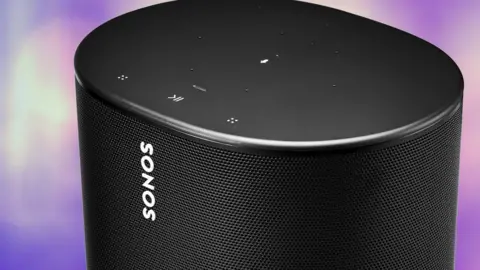Sonos U-turn over 'bricking' its smart speakers
 Getty Images
Getty ImagesSonos will no longer make people "brick" - or permanently deactivate - their smart speakers in order to take advantage of a discount upgrade offer.
In 2019, the company launched a trade-up scheme that offered existing owners 30% off the cost of a new speaker.
But owners had to activate "Recycle Mode" on their existing Sonos speaker, making it permanently unusable - even if there was nothing wrong with it.
Sonos said it had now removed the requirement from its scheme.
Activating Recycle Mode starts an irreversible process that wipes personal data from the device - but also stops the internet-connected speaker working.
The company was criticised for encouraging people to disable speakers that had nothing wrong with them.
Sonos said the policy was to "encourage responsible disposal of older devices".
But critics said it would be much more environmentally friendly to let people sell their old speakers or donate them to family, friends or charity shops.
"The concept of trading in old Sonos speakers is brilliant, but just bricking it and asking you to send to a recycling centre doesn't make any sense," said Stuart Miles, founder of technology news website Pocket-lint.
The process of ruining gadgets and making them inoperable is known as "bricking", because it makes the device about as useful as a brick in technology terms.
Sonos said people could now apply for the upgrade discount just by registering the serial number of their existing speaker.
"We also respect the customer's right to decide for themselves when a product has reached the end of its useful life. So, while we are fully committed to supporting customers that wish to recycle their old hardware, we removed the Recycle Mode requirement from the program," the company said in a statement.
"Customers still receive a 30% discount on new Sonos products, but they can now choose what to do with their old device - continue to use it, give it to a friend, donate it to charity, responsibly recycle it at their local e-waste facility or send it back to Sonos via a prepaid shipping label."
Last year, the company also faced criticism after announcing it would no longer release software updates for some of its older speakers.
The change affected four models sold between 2006 and 2015.
It said it had to make the change because older hardware would not be able to support the new software.
